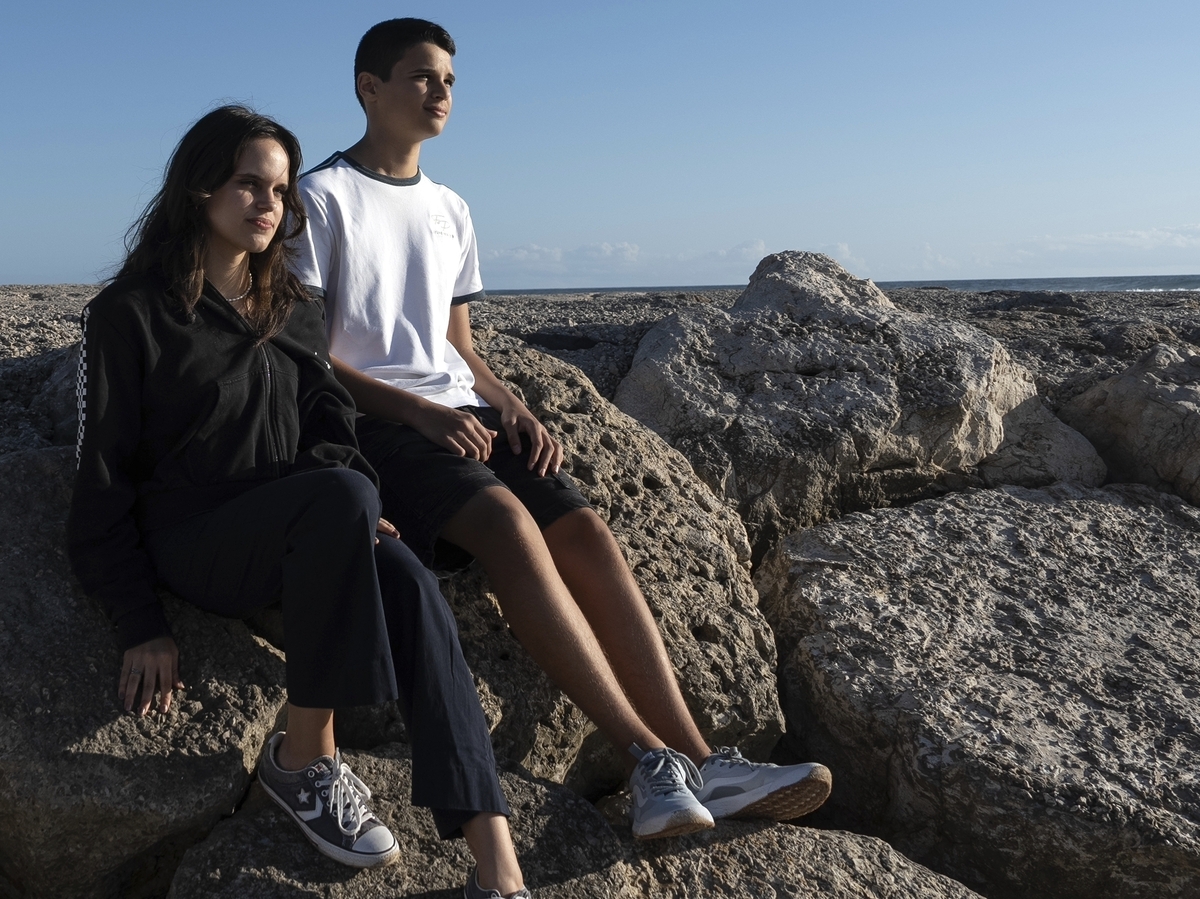
Siblings Sofia Oliveira, 18, and Andre Oliveira, 15, pose for a photo on the beach in Costa da Caparica, south of Lisbon, Wednesday September 20, 2023.
Ana Brigida/AP
hide caption
toggle caption
Ana Brigida/AP

Siblings Sofia Oliveira, 18, and Andre Oliveira, 15, pose for a photo on the beach in Costa da Caparica, south of Lisbon, Wednesday September 20, 2023.
Ana Brigida/AP
COSTA DA CAPARICA, Portugal (AP) — Sofia Oliveira was 12 years old when catastrophic wildfires in central Portugal killed more than 100 people in 2017. She “felt it was now or never to raise awareness voice” while his country appeared to be in the grip of deadly man-made climate change.
Now a university student, Sofia and five other Portuguese young adults and children aged 11 to 24 are due to appear before the European Court of Human Rights on Wednesday, where they accuse 32 European governments of violating their human rights for what they consider to be a failure in adequately combating climate change. It is the first climate change case filed in court and could force measures to significantly reduce emissions and build cleaner infrastructure.
A victory for them in Strasbourg would be a powerful example of young people taking a legal route to force their governments to adopt a radical recalibration of their climate measures.
The court's decisions are legally binding on member countries, and failure to comply exposes authorities to heavy fines decided by the court.
Activists increasingly view courts as a way to circumvent politics and hold governments to account. Last month, in a case brought by young environmental activists, a judge in the US state of Montana ruled that state agencies were violating their constitutional right to a clean and healthy environment by allowing fossil fuel development.
When the Portuguese group decided in 2017 to take legal action, Sofia was wearing braces, was taller than her younger brother André and was starting seventh grade at school. Braces are long gone and André, now 15, is a few inches taller than her.
The last six years, André noted in an interview with the Associated Press, represent almost half of his life.
What has driven them to wade through piles of legal documents assembled by the nonprofit group supporting them and endure lockdowns during the COVID-19 pandemic is what they call the pressing evidence around them that the climate crisis is getting worse.

Praia do Norte beach on the Costa da Caparica, near Sofia and André's home, just south of the Portuguese capital Lisbon, was about 1 kilometer (3,000 feet) long when his father was his age, André says. Today, amid coastal erosion, it is less than 300 meters (1,000 feet). Such evidence led him to attend climate protests even before he became a teenager.
The other four members of the Portuguese group – Catarina, Cláudia, Martim and Mariana – are siblings and cousins who live in the Leiria region of central Portugal, where summer forest fires are common.
Scientists say the Sahara climate extends across the Mediterranean Sea to southern European countries like Portugal, where average temperatures are increasing and precipitation is decreasing. Portugal's hottest year on record was 1997, followed by 2017. The four driest years on record in the country of 10.3 million people have all occurred since 2003.
The story is similar across Europe, and the legal arguments of the six Portuguese are supported by science. Earth experienced the hottest summer on record in the Northern Hemisphere, with a record-breaking August and a season of brutal, deadly temperatures, according to the World Meteorological Organization.
The world is far from fulfilling its promise to curb global warming, scientists say, by reducing emissions in line with the requirements of the 2015 Paris climate agreement. Estimates suggest global average temperatures could rise by 2 to 4 degrees Celsius (2.6 to 7.2 Fahrenheit) since pre-industrial times by 2100, if we follow current trajectories of warming and emissions reduction plans.
Specific impacts cited by young Portuguese people include the inability to sleep, concentrate, play outside or exercise during heat waves. One of their schools was temporarily closed when the air became unbreathable due to smoke from the wildfires. Some children suffer from health problems such as asthma, which make them more vulnerable to heat and air pollution.
They benefit from the help of the Global Legal Action Network, an international non-profit organization that challenges human rights violations. A crowdfunding campaign has garnered support from around the world, with messages of support coming from as far away as Japan, India and Brazil.
Gerry Liston, GLAN's legal adviser, says the 32 governments have “trivialized” the matter. “Governments have resisted every aspect of our cause…all our arguments,” he said.
André describes governments as “condescending”. Sofia adds: “They don’t consider climate a priority. »
The Portuguese government, for example, recognizes that the state of the environment and human rights are linked, but insists that “the government's actions aim to respect its international obligations in this area” and cannot be criticized.
At the same time, some European governments are backtracking on commitments already made.
Poland last month filed legal challenges seeking to overturn three of the European Union's key climate change policies. Last week, the UK government announced it was delaying by five years a ban on new petrol and diesel cars which was due to come into force in 2030. At the same time, the draft state budget presented by the Swedish government last week planned to reduce taxes on gasoline and diesel and finance climate and environmental measures.
In this context, the courts are seen by activists as a recourse.
The London School of Economics says that globally, the cumulative number of cases linked to climate change has more than doubled since 2015 to more than 2,000. About a quarter were launched between 2020 and 2022, it says. -we.
The Portuguese activists, who are not demanding any financial compensation, will probably have to wait longer. The verdict in their case could take up to 18 months, although they view the court's decision in 2020 to speed up proceedings as an encouraging sign.
A precedent also gives heart to activists. The Urgenda Foundation, a Dutch organization that promotes sustainability and innovation, brought the world's first case against the Dutch government in which citizens argued that their government had a legal obligation to prevent dangerous climate change.
In 2019, the Dutch Supreme Court ruled in favor of Urgenda, ruling that the government's emissions reduction target was illegally low. He ordered authorities to further reduce emissions.
The government therefore decided to close coal-fired power plants by 2030 and adopted billion-euro measures to reduce energy consumption and develop renewable energy, among other measures.
Dennis van Berkel, Urgenda's legal advisor, accused governments of choosing climate change targets that are “politically convenient” instead of listening to climate scientists. Judges can force them to justify that what they are doing on climate issues is enough, he said.
“Currently there is no such oversight at any level,” he told the AP. “This is something extremely important that the courts can contribute to.”
Source link
activists,difficult,Climate,court,Day,Governments,Young
#Young #climate #activists #challenge #governments #win #case #court






